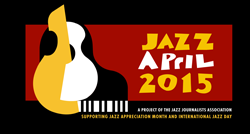
Clark Terry Tells His Story
Clark Terry is one of the bright, indomitable spirits in American music. Of course, jazz is his specialty and he’s never run from the term or tried to change or over-explain it. He embraces jazz and is unabashed about his love for it. That’s obvious to anyone who’s seen him perform over several decades. It’s reinforced and embellished in his autobiography released this year, simply titled Clark (University of California Press), written with the assistance of his wife of 19 years, Gwen.
It’s an enjoyable read, lighthearted like the man himself, told in a natural style. It’s not critical or analytical like a biography from an author looking in from a different view. It’s like a journal, but one that gives the reader pictures from the inside of one of the wonderful careers in music. And as many smiles as we’ve seen on the face of the man who will be 91 on Dec. 14, it’s not all glee. Terry experienced hardship, disappointment, racism and discouragement along the way. But he was unyielding. He always steered the course. Always came out on the other end better for it.
That’s been a great thing for jazz.
Terry’s an enjoyable storyteller, with flair and humor. He also speaks frankly and exposes his human blemishes. During his life on the road with the great big bands--including George Hudson, Charlie Barnett, Count Basie and Duke Ellington--Terry drinks, gambles, cavorts with ladies--All things that traveling musicians did back in the day. These are not horrible things. In fact, the book exemplifies that Terry is a man of character. Terry came from a family with a too-strict, physically abusive father whom he eventually had to leave--never to see again. He doesn’t say “woe is me.” In fact, he eventually comes to understand at least what was at the root of his father’s sternness and uses it as a source of strength through his life. Think many people today take those kinds of lemons and make them lemonade? Fat chance. He also reveals he never graduated high school because he impregnated a girlfriend. It was a source of severe disappointment. But again, terry is resolute.
Terry introduces a lot of colorful characters that flow in and out of his life, some having nothing to do with music, like his childhood friend “Shitty.” He constructed his first trumpet out of junk; that’s how badly he wanted to play. The agreeable Terry also had his limits. He knew how to box and carried a blade in case of trouble. He didn’t take shit from people. But he treated people with the respect they deserved. He knew all the cats in music. He mentored a young Miles Davis, who always called Clark one of his idols. Played with all of ’em. Dizzy Gillespie, Charlie Parker, Thelonious Monk, Charles Mingus (with whom he came close to one of those physical confrontations the enigmatic bass player was known for--but didn‘t back down), all the big band stalwarts. Loved Duke and Basie, and vice versa. He also recounts associations with people like Norman Granz and Billy Strayhorn. He has a great way of describing them and his stories illuminate the people and the era in which they thrived.
The trumpeter was the first black man on the NBC music staff and spent a long time with the Tonight Show band. His arranging and writing talents came to the fore working with large groups and Terry eventually reached his dream of having his own big band. He also championed the flugelhorn; like he championed the careers of so many young musicians. Those stories are all there. As is the genesis of his character “Mumbles,” the unique scat singer that was born on the Tonight Show during the popular “stump the band” segment and caught real fire after he recorded “Incoherent Blues,” a song employing the wordless vocal technique on the album Oscar Peterson Trio + 1 (Philips, 1964), produced by Granz. Peterson, he divulges, fell out laughing when he first heard Mumbles.
Terry toured everywhere, seemingly with everyone, and has appeared on more than 900 recordings (He’s the recipient of a Grammy Lifetime Achievement award, among his many honors). He‘s undoubtedly got more stories than he could fit into the book. But one touching and highly important aspect to Terry’s career that is explained and examined closely is his dedication to jazz education and helping young people develop. He was always generous with younger musicians, but the formal part of teaching started in the 1970s. It picked up speed at the behest of the great pianist/composer Billy Taylor (another feather in the cap of the multi-talented Dr. Taylor) who got Terry involved in conducting clinics.
“I knew this was something I wanted to do for the rest of my life,” he writes. “I decided that my crazy schedule had to go. I had to make room to teach.” It led to years and years of enriching the lives of young musicians and also to a pair of books on trumpet instruction. The great pleasure Terry takes in having a positive impact on young folks is blissfully evident. His accomplishments are sooooo numerous. An “Honors and Awards” section runs for 8 1/3 pages, but the immeasurable impact of Terry’s mentoring perhaps supersedes them all (though many of those awards are related to education).
Clark is a breezy read, fast paced and enjoyable. Honest and genuine. It was a great idea for this young man to get it down on paper.






No comments:
Post a Comment